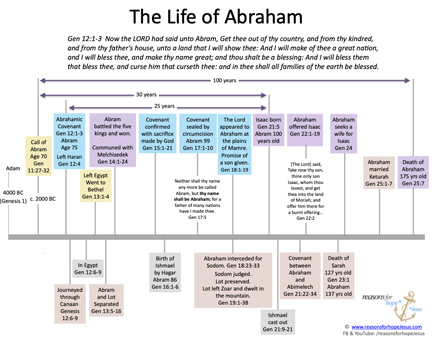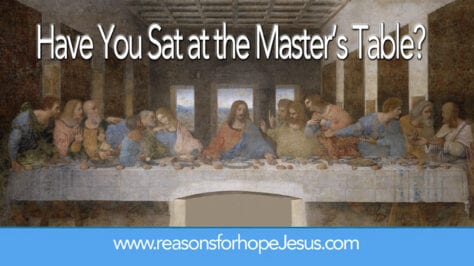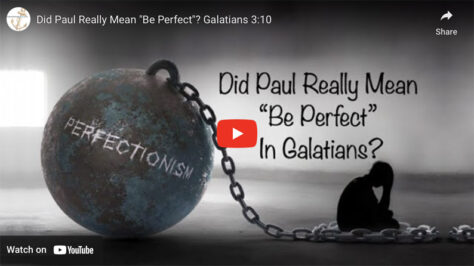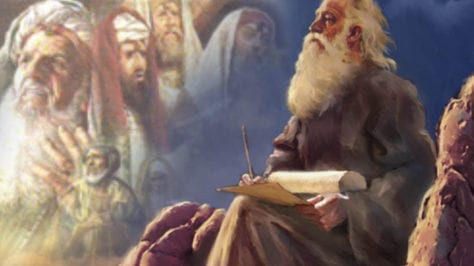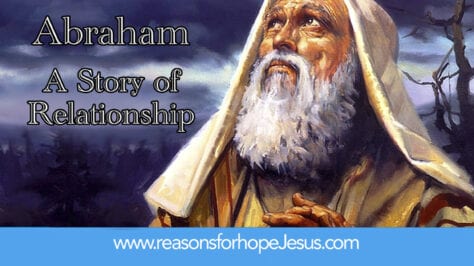
The Bible is a story of relationships. The key relationship in its many chapters and books involves God and His people. God has two people that He calls His own: the Jews and the Body of Christ. To understand the second in total, we must understand the failure of the first. Let’s go to the story of Abraham.
The story of Abraham begins in Genesis Chapter 12 and runs through Genesis 25. After Chapter 25, the Book of Genesis begins to focus on the lineage, or generations, of Abraham’s children that ultimately lead to the Nation of Israel. This includes Abraham’s son Isaac, Isaac’s son Jacob (later known as Israel), and Jacob’s 12 sons — and most specifically, Jacob’s son Joseph. The next book of the Bible, Exodus, begins with a focus on Moses and his role in leading the Nation of Israel.
Before we begin our study of Abraham, let’s establish the context (timeframes, geographies, etc.). The timeframe of Abraham is about 2000 BC, about 4000 years ago. Adam and Eve lived about 6000 years ago (about 4000 BC), and their lives and times are covered in the first three chapters of Genesis. The next 2000 years of man’s early history (from Adam to Abraham) are covered in the eight chapters between the end of Genesis 3 and the beginning of Genesis 12. The two main events in those chapters are Noah and the Flood and Nimrod and the Tower of Babel. For this study, let’s look at how those two events relate to Abraham.
Abraham
There is no doubt, even among the most ardent atheist scholars, that a man named Abraham surely lived around 2000 BC and archeology and records of many cultures support all the descriptions of the places and peoples that are described in Genesis. Abraham is among the most important historical figures in a number of ethnicities beyond Judaism so his historical existence is well validated.
Genesis 1-8
In these 8 chapters of Genesis, and the 2000 year period from Adam to Abraham that they cover, the record tells mostly of a sad and failed period of early human history. It is certain that Adam and Eve had taught their children and grandchildren and all generations about God. They had shared significant insights about His instructions on family, societal constructs, and religious and legalistic expectations and behaviors. The roots of what they taught their generations would later be seen in the Laws that God gave to Moses and the Hebrew people.
But sadly, and predictably, it did not take long before future generations began to “forget” or “reject” the notions of the God of Adam. They began inventing new gods and making images to worship. Polytheism (the belief that many things and creatures are gods) and idolatry (the worship of man-made objects believed to possess god-like qualities) rapidly became the norm among all of the children of Adam. In fact, at the time of Noah (about 300 years before Abraham), it would appear that Noah was the last man alive that still believed in the God of Adam and worshipped Him as Adam had instructed. Thus, the Flood was a way of God starting again, and entrusting that Noah and the eight members of his family would “re-boot” the world and renew a knowledge, belief, and worship of the One and Only True God.
Rebellion Repeated
Sadly, it was only 100 years until the descendants of Noah and his sons began to rebel, turning away from Adam’s and Noah’s God and seeking gods among the mightiest and smartest of men. In this twisted way of thinking, they found a mighty man named Nimrod. Now Nimrod liked being thought of as a god, and so he decided to build a tower in a place called Babel (today’s city of Babylon in Iraq) that would reach far into the sky. Nimrod thought to place his throne on top of it and live as a god, looking down on the people of the world.
But God intervened and “divided” the people of the world by languages and geography. God then sent/drove the various sons of Noah in different directions across the vast expanse of lands They began to “carve out” their own cultures, nations (kingdoms), and traditions. From these various newly formed cultures that formed nations, God purposed to “call out” one nation to be His own, to do what Adam and Noah had tried, but failed, to achieve. And just like Adam and Noah, God would teach this Nation all about Himself and His ways. And His “Chosen Nation” would in turn teach all nations and all people about the True God, Adam’s God, Noah’s God.
The Call of Abraham
Before God could “call out His own Nation” from among the nations of the world, He first purposed to call out a single man from whose seed the people of that nation would spring. The man God chose was named Abram (God later changed his name to Abraham). Abram was the son of Terah, who was the son of Shem, who was the son of Noah.
At the time God called out Abram he lived in a place called Ur, in southern Mesopotamia, not far from Babylon. God’s calling to Abram was to leave his family and his home and go to the land of the Canaanites, which is the land of Israel today. There, he would establish this new nation.
The first time God called Abram to this service, Abram apparently ignored God’s call. Instead of going to Canaan, Abram left Ur with his father and went to a place in modern Turkey known as Haran. It was there in Haran that God gave His second call to Abram.
Genesis 12: 1-3
1 Now the Lord had said unto Abram, Get thee out of thy country, and from thy kindred, and from thy father’s house, unto a land that I will shew thee: 2 And I will make of thee a great nation, and I will bless thee, and make thy name great; and thou shalt be a blessing: 3 And I will bless them that bless thee, and curse him that curseth thee: and in thee shall all families of the earth be blessed.
These three verses of Chapter 12 are the “call of Abram” and they include the covenant promises that God made to him. The elements of the calling are that God asked Abram to
- leave all that He had and to go where He would tell him to go.
- leave the world he knew (and in which he had done quite well for himself) and go to a place he did not know; leaving behind his family, friends, and relationships.
It was a calling of Abram “out of his world and into God’s world.” And it is symbolic of how God calls all of us out of “us” and into “Him.” It takes enormous faith and trust; and often seems foolish to some around us.
Another thing about the “calling out” of Abram was that Abram had done NOTHING to indicate that God called him because he was special, or good. In fact, we learn from Paul that Abram ignored God’s first call. And Abram, in both Ur (Babylon) and Haran (Turkey) was not surrounded by many believers in the True God. This is similar to God’s call of us, while we were yet sinners, and making us wholly different and new.
The Covenant
Let’s focus on the promises (covenant) that God gave Abram. God said IF you trust me and heed my “call” (i.e., leave your country, family, lands, and home AND go to someplace I send you), THEN I will:
(1) make your descendants a great NATION,
(2) deliver to you great possessions and wealth,
(3) make your name and your children MUCH RESPECTED AND HONORED among all peoples and nations of the world, and
(4) protect you by blessing those who bless you and punishing those who try to harm you.
God reiterated this promise and refined it, making clear what it means to be a “great nation.” In God’s plan, “a great nation” means…
- a LAND (with clear and sound borders),
- a PEOPLE (a unique bloodline and culture), and
- a great KING to rule (Government).
God also made it clear that this Government (King/Kingdom) would last forever.
Pause and Consider
We could say that well after Abraham died, Israel took possession of the specific land God promised. But that was many, many years after Abraham, and they never had complete control of all the land God promised. And we could say that Israel eventually did become a great kingdom under King David. But that Kingdom was utterly destroyed over the following centuries.
So what does this mean? Did God not keep His promises?
Two Important Lessons
Both of these lessons speak to FAITH. The first lesson is about God’s timing, not ours. The second is about God’s process, not ours.
When God calls us, it is almost never what we expect, and it is always much harder than we think. Moreover, God’s timeframe for fulfilling His promises is often (if not always) much more distant than our expectations. Granted, rarely are the timeframes as long as those involved with Abraham (4000 years and counting!) but the point is God’s call, and God’s promises, are born in FAITH. Therefore, that faith is tested and thoroughly tried to ensure it is true faith (and not just expecting “treats” from God).
God has not fulfilled all His promises to Israel yet. Israel’s pride in thinking she was “right” with God caused her to reject the Savior, whom God sent, and look for a king. God wants Israel to cry out for the Savior before she welcomes the King. Israel’s religious pride is a barrier to God’s mercy, and therefore it must be broken. Once Israel’s pride is shattered and she no longer trusts in her own brilliance, religious righteousness, and fierce tenaciousness, she will turn to God, recognize that Jesus was her promised Messiah, and call out for her rejected Savior Jesus to return. This will make the time full (ripe) and then God will fulfill all the promises He made to Abraham.
+++
The Life and Faith of Abraham
- Timeline of the Life of Abraham
- A Story of Relationship
- From Haran to Canaan
- Abraham and Lot
- The Battle of Siddim
- Abraham and Melchizedek
- Righteousness Through Faith
- Cutting the Covenant
- Hagar and Ishmael
- A New Name for A New Man
- Circumcision: the Sign of the Covenant Read also: Why Circumcision?
- Sarah — A New Name for a New Woman
- The Lord Appeared to Abraham at The Oaks of Mamre
- Abraham Pleaded for Mercy for Sodom and Gomorrah
- The Rescue of Lot Out of Sodom
- Lot and His Daughters
- The Birth of Isaac, the Son of the Promise
- The Akedah: God’s Testing of Abraham’s Faith and Obedience
- ISAAC: A Whisper of Jesus in Genesis 22
- The Death of Sarah and A Bride for Isaac
- Jacob and Esau - Great Life Lessons + the Pattern of the Second Born
- Isaac’s Blessing on Jacob: Genesis 27
- Jacob’s Ladder and His Wrestling Match — Genesis 27, 32
*******
Jesus is the Reason this Ministry Exists
At Reasons for Hope* Jesus, we are committed to equipping, encouraging, and empowering Christians to know Jesus better, love Him more, and share their faith. We also reach the lost through our Salvation Page.
With your support, we can continue to provide valuable resources and engaging content. Please join us in our mission by donating today. Your generous contribution helps us expand our outreach of sharing biblical truths and hope in Jesus. Thank you for your kindness and for being an integral part of our mission.
*******
*******
***A Hidden Message in Psalm 23?***
Hidden in the six verses of Psalm 23 are 11 names for Jesus. When you subscribe to our newsletter, we’ll send you The Names of God in Psalm 23 PDF that reveals all 11 names and Scripture verses of comfort and hope (link will be sent in your confirmation email).
 A Room with a View of Eternity—The Last Will & Testament of Jesus Christ Take a seat at the Master's table. Learn about the riches He gives to all who are His. This book will bless and encourage you, give you hope, and help you live in the joy of your salvation and the riches of Christ that are yours.
A Room with a View of Eternity—The Last Will & Testament of Jesus Christ Take a seat at the Master's table. Learn about the riches He gives to all who are His. This book will bless and encourage you, give you hope, and help you live in the joy of your salvation and the riches of Christ that are yours.

The Top Ten Got Questions? in 2023
- The Meaning of NUMBERS in the Bible?
- Was Jesus CRUCIFIED on Wednesday, Thursday, or Friday?
- How was Jesus Like a Worm? What’s the CRIMSON (OR SCARLET) WORM in Psalm 22?
- How are the Shepherd’s ROD and STAFF Different?
- How long did JOB SUFFER?
- What is the Significance of the Wise Men's THREE GIFTS? And were they kings?
- Did The Wise Men Arrive 12 DAYS AFTER JESUS’ BIRTH? Or Was It Much Later?
- Jesus’ Last Days TIMELINE: the Cross and the Resurrection
- The Meaning of COLORS in the Bible?
- Did Jesus Fight Satan to Take Back the KEYS of Death and Hell?
There is much to be learned from those who have gone before us in the faith. Check out our Cloud of Witnesses category that features the words of departed saints who are now with the Lord in glory. Their words equip and encourage us even to this day. Take a few minutes to hear...
- ONLY ONE LIFE, Twill Soon Be Past – by C.T. Studd (1860 – 1931)
- “The Love of God is Greater Far” by Frederick M. Lehman (1917)
- Prayers from Billy Graham
- Who Was Robert Robinson? What’s the Story Behind “Come Thou Fount”
- “Immanuel” — A Poem by Charles Spurgeon (1834-1892)
- Who Am I? A Poem by Deitrich Bonhoeffer (1905-1945)
- Understanding the Everlasting Arms of God, by J.R. Miller (1840–1912)
- 24 Reasons Why I Love America, by John Wayne (1907-1979)
- Give Me Perpetual Broken-heartedness (from The Valley of Vision)
- Abide with Me, by James Smith, 1859
This remains one of our most popular pages viewed.![]()

TOP TEN Videos from Reasons for Hope* Jesus
- Memorial Day BAGPIPES TRIBUTE: Amazing Grace
- RISE AND SHINE and Give God the Glory, Glory!
- WERE YOU THERE When They Crucified My Lord?
- PAUL HARVEY: THE BIRDCAGE
- PRESIDENT RONALD REAGAN: A SOLDIER'S PLEDGE
- Hark! the Herald Angels Sing -- CHARLIE BROWN Christmas
- JOHN WAYNE ~ WHY I LOVE AMERICA
- Jimmy Stewart - Nativity Scene Prayer: Mr. Krueger's Christmas
- THE LEGEND OF THE CANDY CANE - A Christmas Story to Share
- Not by Might, Not by Power, But BY MY SPIRIT says the Lord (Zechariah 4:6)
*****************


